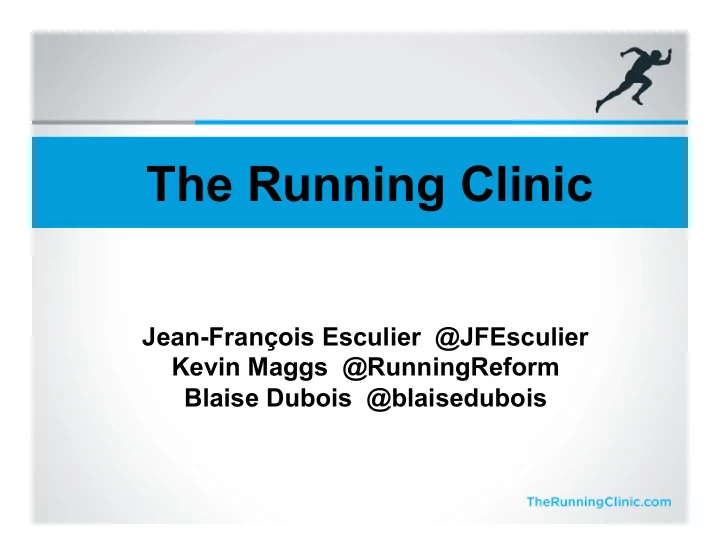

The Running Clinic Jean-François Esculier @JFEsculier Kevin Maggs @RunningReform Blaise Dubois @blaisedubois
Disclosure All speakers and The Running Clinic TM have NO financial relationships with commercial interests
Cause of Overuse injuries MISADAPTATION Mechanical Intrinsic Extrinsic Stress Factors Factors Training Running shoes Biomechanics Surface Muscle dysfunction errors Tissue frailty
Postulation THE BODY ADAPTS As long as the applied stress is not greater than its capacity to adapt
100% Overstepping maximal capacity is Max. adaptation felt by : 1. Pain during 2. Pain after 3. Morning Stiffness Minimal stress to create adaptations Individual stress S levels according to T activities R E S S 0% No mechanical stress Time Adaptation Zone Rest Zone Area in which training will help No stress = No increase the body’s capacity to adaptation! support stress
Biomechanics & pathologies There is generally NO LINK between anatomical peculiarities and kinematics and lower limb injuries. Except if acutely changed
Stretching BEFORE AT DISTANCE § Negative influence § Positive effect on on performance performance (especially if duration is > 60sec) § Positive influence § Doesn’t decrease on the prevention the risk of injury of injuries § Doesn’t prevent DOMS § Doesn’t improve post-workout recovery
Safe running gait Lower vertical loading rate injuries Optimal control and stability of the lower limb
Safe running gait Lower SOLUTIONS vertical loading ü Ç foot sensations rate ü Run softer Optimal control and ü Ç cadence stability of the ü Strengthening lower limb
Footwear providing minimal interference with the natural movement of the foot with its high flexibility, low weight, stack height and heel to toe drop, and the absence of motion control and stability technologies.
100% MINIMALIST INDEX 0%
Maximalist running shoes increase load on
Minimalist running shoes increase load on
Transitioning to minimalist shoes months months months months months The 1-min more / training rule 1 month for every 10-20% change in MI
Listing of Running Shoe Stores Boasting a Practice based on Scientific Evidence 1. A choice that mirrors client request It is important not to destroy the beliefs of the client with unfounded arguments or with recommendations based upon our own beliefs. It is also paramount to respect any prescription that may have been issued previously by a specialist. 2. A scientific and logical selection that supersedes marketing incentives The concepts taught to any client must be centered on science-based evidence or, in the event of a lack of data in that regard, on evidence stemming from a clinical reasoning coupled with a rich professional experience. Commercial influences and profits related to the sale of a specific type of shoe should never influence salespeople in the choices they submit to clients. 3. A choice primarily based on ergonomics Comfort, absence of pressure points respect of the size, width and shape of the foot (both when static and dynamic). 4. A choice geared toward ultra-minimalism for children 5. A minimalist selection for beginner 6. A choice not based on the arch of the foot 7. A choice not based on an individual’s weight
Running Program • Interval training to maximize physiological stress while minimizing mechanical stress • According to symptoms and comfort, accelerate or slow down the proposed progression. • Frequent stimuli in order to create soft tissue adaptations by running minimum 4 x / week • Ensure proper biomechanical preparation by walking 5 minutes. • Complete your workout schedule with a cross-training activity that produces less mechanical stress while providing positive vascular and metabolic effects on soft tissue repair.
Recommend
More recommend